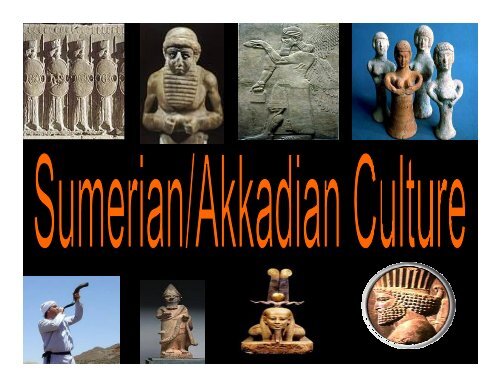HIST 212 Sumerian-Akkadian Culture
HIST 212 Sumerian-Akkadian Culture
HIST 212 Sumerian-Akkadian Culture
Create successful ePaper yourself
Turn your PDF publications into a flip-book with our unique Google optimized e-Paper software.
Sumer, 3200-2350 B.C. Sargon’s Empire, 2350-<br />
2320 B.C.<br />
The Amorite invasions, 2100-1900 B.C.<br />
The Dynasty of Ur,<br />
2100-2000 B.C.<br />
Reign of Hammurapi of Babylon,<br />
1792-1750 B.C.
The Ancient Fertile Crescent Area<br />
“The Cradle of Civilization”
<strong>Sumerian</strong>s
Sumer, 3200 3200-2350 2350 B.C.
Mesopotamian Trade<br />
“The Cuneiform World”
Cuneiform: “Wedge-Shaped” Writing
Cuneiform Writing
<strong>Sumerian</strong> Scribes<br />
“Tablet House”
<strong>Sumerian</strong> Religion - Polytheistic<br />
Ea Ishtar<br />
Anthropomorphic Gods
Gods and Goddesses<br />
•Sin (the moon)<br />
•Father figure<br />
•Shamash (the sun)<br />
•Deity of justice<br />
•Ishtar (the morning star)<br />
•Sex, war, community
Gods and Goddesses<br />
•Ereshkigal goddess of the<br />
Underworld<br />
•Ea god of fresh water
“Mountain of<br />
the Gods”<br />
Ziggurat at Ur
The Royal Standard of Ur
Sargon of Akkad:<br />
The World’s First Empire [<strong>Akkadian</strong>s]
Sargon of Akkad unifies<br />
Mesopotamia:<br />
World’s first empire, ca. 2240 B.C.
Uruk: a substantial ceremonial hub by 3500 B.C.
Uruk
Ziggurat of Ur
Map of<br />
Nippur
Complexity of <strong>Akkadian</strong>s as seen through “tokens”
<strong>Sumerian</strong>/<strong>Akkadian</strong> Class System<br />
The Aristocracy<br />
Peasantry<br />
The King<br />
The Governors
The roles and rights<br />
of <strong>Sumerian</strong> women
Status of Women<br />
Status declined over time<br />
• Early Sumer: more or less equality<br />
between the sexes<br />
• Artisan occupations were open to women<br />
• Adultery was the worst crime in marriage
• Divorce was initiated by husbands<br />
• Sexual and Marital Life<br />
– Arranged marriages<br />
– Dowry<br />
– Brides were expected to be virgins
Board Game From Ur
Bronze Metallurgy Skills<br />
at Ur
Mesopotamian Harp
<strong>Sumerian</strong> Cylinder Seals
Gilgamesh
Gilgamesh Epic Tablet:<br />
Flood Story
The Babylonian Empires
Hammurabi’s Code<br />
[r. 1792-1750 B. C. E.]
Hammurabi, the Judge
Babylonian Math
Babylonian Numbers
MAP 2.1
• Hammurabi, king of Babylon (ca. 1792 –<br />
1750 B.C.E.), created the next great<br />
empire in Mesopotamia<br />
• He is remembered today largely because<br />
of his law code
Law<br />
Earliest known complete code of laws:<br />
Principles<br />
– Punishment depends on social rank<br />
– Victim’s right to personal compensation<br />
– Government is impartial referee
Hammurabi’s Empire
SUCCESSORS TO THE SUMERIANS<br />
• Successors<br />
– <strong>Akkadian</strong>s (under Sargon)<br />
– Amorites, or Old Babylonians (under Hammurabi)<br />
– Hittites<br />
– Assyrians<br />
– Chaldees or New Babylonians
• Decline of Mesopotamia in World History<br />
– Ceased to be important after the Persians<br />
conquest the region (580s B.C.E.)
II. The Hittites<br />
• spoke an Indo-European language<br />
• arrived in Anatolia perhaps as early as 2700<br />
BCE<br />
• settled as farmers and herders in the lands of<br />
existing Anatolian kingdoms<br />
• were probably backwards compared to the<br />
sophisticated kingdoms that were their<br />
neighbors
• warfare among the Hittites’ neighbors<br />
gave them the opportunity to rise to<br />
prominence<br />
• in 19 th century BCE king Hattusilis I built<br />
the capital at Hattusas<br />
• conquest of neighboring land begins
• Hittites may have had an advantage over<br />
the Anatolian kingdoms they conquered<br />
because of their iron weapons<br />
• the Hittites were the first people to make<br />
weapons and tools out of this metal<br />
• they conquered much of Anatolia and<br />
even campaigned beyond Anatolia
• around 1595 BCE the Hittites participated<br />
in an attack on Babylon<br />
• this attack led to the overthrow of the<br />
dynasty that Hammurabi had founded two<br />
centuries earlier<br />
• the Hittites probably participated in the<br />
sacking of the city, then returned home
• much of what is now known about the<br />
Hittites comes from clay tablets found at<br />
Hattusas and other locations, artifacts, and<br />
excavations of Hittite cities<br />
• the Hittite tablets are written in cuneiform,<br />
which they adopted for their language
• The Hittite Empire was at its strongest<br />
between about 1475 BCE and 1200 BCE<br />
• Hittite warriors fought the Egyptians and<br />
Rameses II to a standstill at Kadesh<br />
around 1300 BCE<br />
• peace followed the battle with both sides<br />
realizing that a treaty of peace was better<br />
than continued bloodshed
the Second<br />
Millennium<br />
B.C.E.<br />
The Middle East in the Second Millennium B.C.E.<br />
Although warfare was not uncommon, treaties, diplomatic missions, and correspondence in <strong>Akkadian</strong> cuneiform<br />
fostered cooperative relationships between states. All were tied together by extensive networks of exchange<br />
centering on the trade in metals, and peripheral regions, such as Nubia and the Aegean Sea, were drawn into the<br />
world of commerce. (Copyright (c) Houghton Mifflin Company. All Rights Reserved.)<br />
Copyright © Houghton Mifflin Company. All rights reserved.
• slaves<br />
The Hittites had a complex society:<br />
• commoners – farmers, craftsmen, herders<br />
• warriors – possibly also commoners<br />
• warriors sat in an assembly that could try cases<br />
and order punishments, but could not make<br />
laws
• nobles – strong; frequent challengers of<br />
the king’s authority<br />
• royal family – also a noble family;<br />
members of this family held influential<br />
posts<br />
• Hittite nobles and the royal family<br />
frequently quarreled, and plots against the<br />
royal family were frequent
• The Hittite Empire fell abruptly around<br />
1200 BCE<br />
• The cause?<br />
• The Sea Peoples raided and destroyed<br />
Hittite cities.<br />
• So vicious were these attacks the Hittite<br />
Empire collapsed.
The Dynasty of Ur,<br />
2100 2100-2000 2000 B.C.


